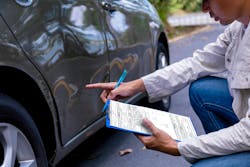Last month, we explored the vital role of understanding your customer base and how it sets the foundation for a successful collision shop. This month, we’re taking it a step further by tackling one of the biggest challenges in the collision repair industry: attracting new customers and turning existing ones into loyal advocates who bring you referrals.
While visibility is crucial, earning a customer’s trust goes far beyond just getting them to walk through your doors. It’s about educating them on the repair process, setting clear expectations, and showcasing your expertise every step of the way. In a world where many customers rely on insurance companies to guide them — or worse, make decisions for them — your ability to inform and empower can be the difference between a one-time repair and a lifetime of loyalty. Let’s talk about how education can transform your customer relationships and drive your business forward.
The Journey to Your Door
Customers find your shop in various ways: walk-ins, Google ads, your website (via strong SEO), referrals, and direct mailers or special promotions. Getting potential customers to notice your business and contact you is 85% of the effort. Whether you’re building awareness through community involvement, investing in online marketing, or using CRM tools to track leads, that initial connection is only part of the equation.
Once the customer walks through your door, the remaining 15% is where the magic happens. How do you convert that lead into a loyal customer? Beyond sales strategies, the key lies in one thing: education, education, and more education.
Why Education is Essential
Collision repair is unlike most other industries in the automotive world. In general repair, the transaction is direct: between the shop and the customer. But in collision repair, there’s a third party at play: the insurance company. This dynamic creates unique challenges and confusion for customers, who often come to the shop with little understanding of the process.
Though many people know what a collision shop does, not everyone has experienced using one. With around 6 million passenger car accidents per year in the U.S., that’s a fraction of the 334.9 million people in the country. Many customers rely on secondhand knowledge passed through family or friends, where details often get muddled or misunderstood.
In most cases, the first place they turn to for advice is their insurance company. From there, they’re often steered toward shops on a direct repair program (DRP) list, told to get the lowest estimate, and made to fear their deductible will rise. This misinformation creates a significant barrier to building trust. That’s why collision repair shops must position themselves as the ultimate resource for accurate, reliable information.
Demystifying Collision Repair
One of the biggest hurdles is overcoming the “lowest price” mindset. Customers often walk in the door expecting the cheapest fix without understanding the nuances of quality service. Fixing a dented side panel isn’t as familiar as an oil change, much less explaining why alignment or brake work might also be needed after an accident. For many, hearing that collision and mechanical repairs are connected feels like a scam.
That’s where education comes in. Here’s how you can guide customers through the process:
Empower Customers with Choice
Many customers don’t realize that they have the power to choose their repair shop. It’s critical to educate them that:
- Their deductible is fixed and won’t increase based on where they go.
- Getting the lowest estimate isn’t their primary concern; it’s about quality and safety.
Explain the Repair Process
Break down what it takes to return their car to pre-collision condition. Customers need to understand that repairs often involve both visible and hidden damage. Explain how components like structural integrity, safety systems, and advanced driver assistance systems (ADAS) must be restored to factory standards. While it may feel like speaking a foreign language, making it relatable can build trust.
Clarify the Insurance Relationship
Insurance companies play a pivotal role, but customers often don’t grasp how. Collision repair shops do a great job of handling negotiations in-house to reduce stress for the client. However, it’s vital to set expectations:
- Explain that delays may occur because of insurance approvals.
- Share that repairs using original equipment manufacturer (OEM) parts aren’t always fully covered, and sometimes customer involvement is necessary.
Being upfront about these challenges — without villainizing insurance companies — helps customers see your shop as both transparent and knowledgeable. Even if they visit multiple shops, they’ll remember the one that educated them the most.
Take Education Beyond Your Doors
Educating customers doesn’t stop with the people who walk into your shop. It begins with those who are researching their options online, listening to the radio, or flipping through their mail. It’s about becoming the go-to source of information before they even pick up the phone.
Here are some ways to spread your message:
- Mailers & Promotions: Include tips about choosing a collision shop or understanding insurance policies.
- Website & Blog: Publish clear, easy-to-read guides on topics like "What to Do After an Accident" or "Understanding Your Insurance Estimate."
- Radio & TV Ads: Position your shop as the local expert with ads that focus on trust and quality over price.
- Community Events: Host safety workshops or sponsor events to connect with your community.
- Social Media: Share short videos explaining common collision repair misconceptions.
- Newsletters: Send regular updates to past customers, including maintenance tips and insights into the repair process.
- Local Outreach: Post flyers or handouts at churches, community centers, and local businesses.
Build Trust and Gain Referrals
When you make the effort to educate your customers, you’re not just building trust; you’re creating advocates for your business. Happy, informed clients are more likely to recommend your shop to friends and family. By positioning yourself as the expert, you stand out in an industry where trust is everything.
Make sure your customers leave your shop with confidence, even if they decide to get a second opinion. When they think about knowledge, transparency, and quality, they’ll remember your shop, and that’s how you turn education into loyalty.
So, start spreading the word. Educate. Empower. And watch your car count — and referrals — grow.





